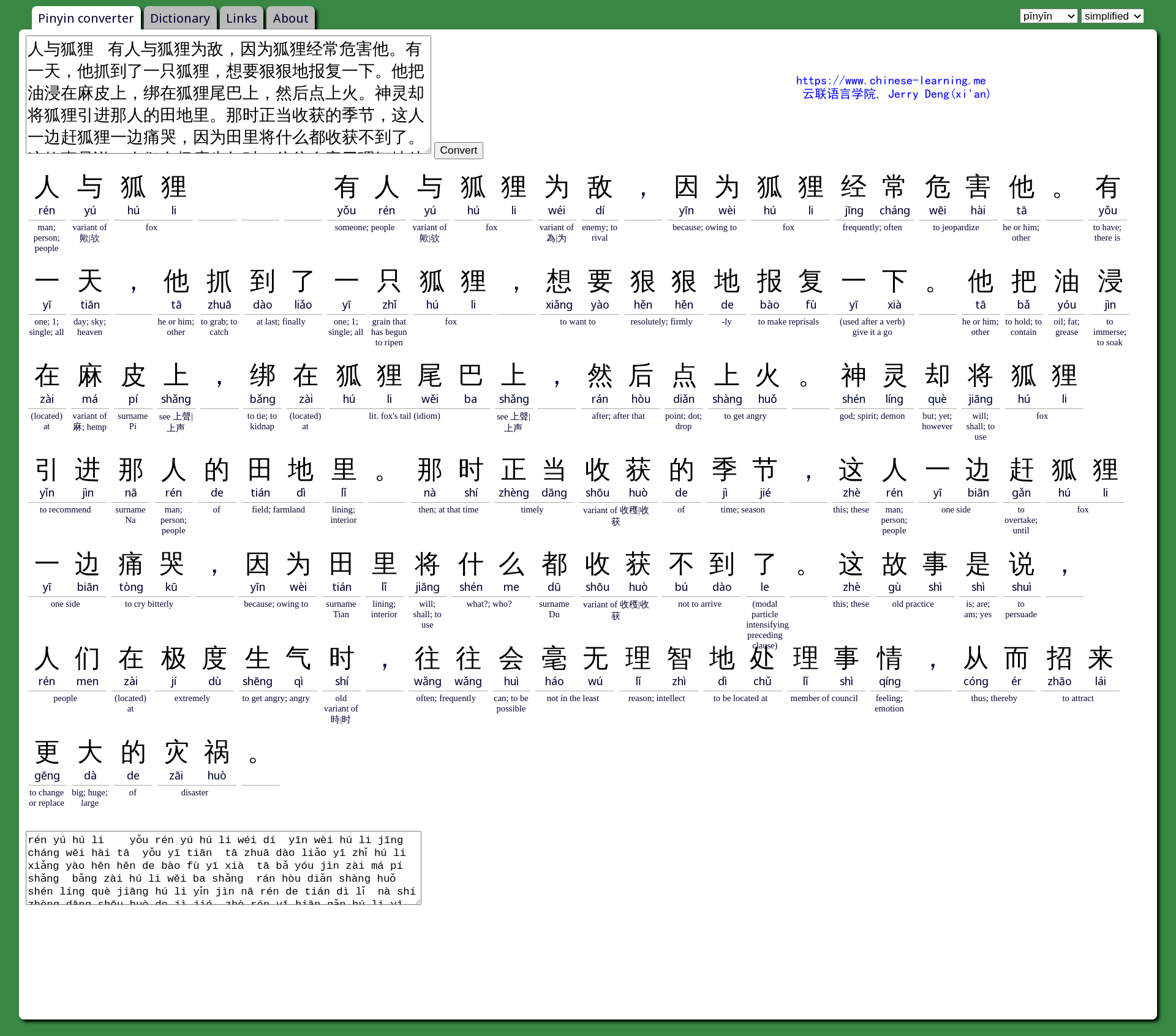
Show Pīnyīn
有人与狐狸为敌,因为狐狸经常危害他。有一天,他抓到了一只狐狸,想要狠狠地报复一下。他把油浸在麻皮上,绑在狐狸尾巴上,然后点上火。神灵却将狐狸引进那人的田地里。那时正当收获的季节,这人一边赶狐狸一边痛哭,因为田里将什么都收获不到了。
这故事是说,人们在极度生气时,往往会毫无理智地处理事情,从而招来更大的灾祸。
yǒurén yǔ húli wéi dí , yīnwèi húli jīngcháng wēihài tā 。 yǒu yītiān , tā zhuā dào le yīzhī húli , xiǎngyào hěnhěn dì bàofù yīxià 。 tā bǎ yóujìn zài mápí shàng , bǎng zài húliwěiba shàng , ránhòu diǎn shànghuǒ 。 shénlíng què jiàng húli yǐnjìn nàrén de tiándì lǐ 。 nàshí zhèngdàng shōuhuò de jìjié , zhè rén yībiān gǎn húli yībiān tòngkū , yīnwèi tiánlǐ jiàng shénme dū shōuhuò bùdào le 。
zhè gùshi shì shuō , rénmen zài jídù shēngqì shí , wǎngwǎng huì háowú lǐzhì dì chǔlǐ shìqing , cóngér zhāolái gēngdà de zāihuò 。

There is a man who is the enemy of the fox, because the fox often harms him. One day, he caught a fox and wanted to take revenge. He soaked the hemp hide in oil, tied it to the fox's tail, and lit it on fire. The gods led the fox into the man's field. It was harvest time at that time, and the man was crying bitterly while chasing the fox, because there would be nothing to harvest in the field.
The story is that when people are extremely angry, they often deal with things irrationally, which leads to even greater disasters.
Hay un hombre que es enemigo del zorro, porque el zorro le hace daño a menudo. Un día, atrapó un zorro y quiso vengarse. Empapó la piel de cáñamo en aceite, la ató a la cola del zorro y le prendió fuego. Los dioses llevaron al zorro al campo del hombre. Era tiempo de cosecha en ese momento, y el hombre lloraba amargamente mientras perseguía al zorro, porque no habría nada que cosechar en el campo.
La historia es que cuando las personas están extremadamente enojadas, a menudo tratan las cosas de manera irracional, lo que conduce a desastres aún mayores.
Il y a un homme qui est l'ennemi du renard, car le renard lui fait souvent du mal. Un jour, il a attrapé un renard et a voulu se venger. Il a trempé la peau de chanvre dans de l'huile, l'a attachée à la queue du renard et y a mis le feu. Les dieux conduisirent le renard dans le champ de l'homme. C'était le moment de la récolte à ce moment-là, et l'homme pleurait amèrement en chassant le renard, car il n'y aurait rien à récolter dans le champ.
L'histoire est que lorsque les gens sont extrêmement en colère, ils traitent souvent les choses de manière irrationnelle, ce qui conduit à des catastrophes encore plus grandes.
キツネがしばしば彼を傷つけるので、キツネの敵である男がいます。ある日、彼はキツネを捕まえ、復讐したかった.彼は麻の皮を油に浸し、それをキツネの尻尾に結びつけ、火をつけました。神々はキツネを男の畑に導きました。その時は収穫の時期で、男はキツネを追いかけながら、畑に収穫するものが何もないだろうと泣いていました。
物語は、人々が非常に怒っているとき、物事を不合理に処理することが多く、それがさらに大きな災害につながるというものです.
Es gibt einen Mann, der der Feind des Fuchses ist, weil der Fuchs ihm oft Schaden zufügt. Eines Tages fing er einen Fuchs und wollte sich rächen. Er tränkte die Hanfhaut in Öl, band sie an den Schwanz des Fuchses und zündete sie an. Die Götter führten den Fuchs in das Feld des Mannes. Es war damals Erntezeit, und der Mann weinte bitterlich, als er den Fuchs jagte, weil es auf dem Feld nichts zu ernten gab.
Die Geschichte ist, dass Menschen, wenn sie extrem wütend sind, oft irrational mit den Dingen umgehen, was zu noch größeren Katastrophen führt.